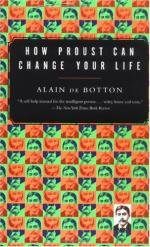|
This section contains 487 words (approx. 2 pages at 400 words per page) |

|
How Proust Can Change Your Life ; Not a Novel Summary & Study Guide Description
How Proust Can Change Your Life ; Not a Novel Summary & Study Guide includes comprehensive information and analysis to help you understand the book. This study guide contains the following sections:
This detailed literature summary also contains Topics for Discussion and a Free Quiz on How Proust Can Change Your Life ; Not a Novel by Alain de Botton.
How Proust Can Change Your Life by Alain De Botton is a whimsical parody of a self-help book. It aims to explore author Marcel Proust's life, as well as Proust's literary works and letters, to uncover some Proustian wisdom that might help the reader to lead a better life.
Proust was an early 20th century author, most famous for his huge novel series In Search of Lost Time, also known more popularly as Remembrance of Things Past. Proust was an infamous recluse and hypochondriac, who died at age 51 after succumbing to pneumonia. Proust spent much time on the French social scene, hobnobbing with aristocrats, although because of his reclusive tendencies and low self-esteem, he suffered great psychological distress in his bid to be friendly and well-liked. Proust's father was a doctor with an international reputation and his brother Robert was a surgeon. Proust struggled to emerge from his father's shadow, drawn to literature and writing instead of a more "respectable" profession. Proust also had an unhealthy relationship with his mother. His mother was extremely smothering to the point that Proust could hardly function without her. For all of these reasons, Proust was fairly unhappy for the majority of his life, a fact he was unafraid to share in numerous letters and indirectly in his works.
De Botton argues that suffering can actually lead to a better and fuller life. As Proust himself might espouse, only in suffering can we learn to appreciate what is around us and to understand it better. Suffering, in fact, leads to knowledge. We should live in the moment and carefully observe our surroundings. The ordinary can be extraordinary and beautiful if we are able to view our world with fresh eyes.
De Botton extends this basic premise of "seizing the moment" into theories of art and readership. Proust would argue that, as readers, we should find something of ourselves in what we read. Works written hundreds or thousands of years ago are still relevant because of their ability to reflect something in ourselves back at us. Artists can help to open our eyes to new experiences and new ways of viewing the world. However, an excessive reliance on art is never healthy because there comes a part when art becomes irrelevant or inadequate to express our unique experience. At that point, the reader must become the writer, artistically creating in order to make his or her own statement on life.
Proust also has some wisdom for friendships and romance. Friendship should be about warmness, affection, and companionship and not necessarily about genuineness or an intellectual exchange of ideas. Therefore, the ideal friend wisely withholds criticisms or opinions about another friend in favor of a congenial atmosphere. On the subject of love, lovers should take pains to make love fresh and ever-new, always beguiling and a pursuit, because if love is too easy and familiar, it necessarily breeds contempt.
Read more from the Study Guide
|
This section contains 487 words (approx. 2 pages at 400 words per page) |

|



